

Cancer, bad luck, and a pair of paradoxes. April 4, 2015 by Rob Noble Among the highlights of my recent visit to IMO were several stimulating discussions with Artem Kaznatcheev.
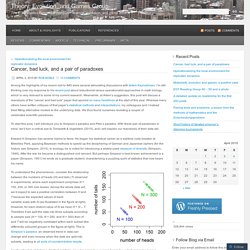
I’m still thinking over my response to his recent post about reductionist versus operationalist approaches in math biology, which is very relevant to some of my current research. Meanwhile, at Artem’s suggestion, this post will discuss a reanalysis of the “cancer and bad luck” paper that spurred so many headlines at the start of this year. Whereas many others have written critiques of that paper’s statistical methods and interpretations, my colleagues and I instead tried fitting alternative models to the underlying data. We thus found ourselves revisiting a couple of celebrated scientific paradoxes. To start this post, I will introduce you to Simpson’s paradox and Peto’s paradox.
Thus primed in paradoxes, let’s return to the work of Tomasetti & Vogelstein (2015). Cancer risk versus lifetime number of stem cell divisions (lscd) on a log-log scale. Five days of eating fatty foods can alter how your body's muscle processes food. You might think that you can get away with eating fatty foods for a few days without it making any significant changes to your body.
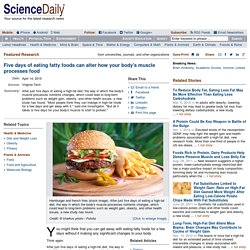
Think again. After just five days of eating a high-fat diet, the way in which the body's muscle processes nutrients changes, which could lead to long-term problems such as weight gain, obesity, and other health issues, a new study has found. "Most people think they can indulge in high-fat foods for a few days and get away with it," said Matt Hulver, an associate professor of human nutrition, foods, and exercise in the Virginia Tech College of Agriculture and Life Sciences.
"But all it takes is five days for your body's muscle to start to protest. " In an article published recently in the online version of the journal Obesity, Hulver and other Virginia Tech researchers found that the manner in which muscle metabolizes nutrients is changed in just five days of high-fat feeding. When food is eaten, the level of glucose in the blood rises. L’excès d’hygiène protège-t-il des allergies ? En mesurant la quantité de moisissures, bactéries et acariens dans les chambres de 3193 bébés, une étude vient de livrer une carte de France de la pollution intérieure.

Objectif : découvrir si celle-ci provoque asthme et autres allergies respiratoires chez les jeunes enfants. Dis-moi où tu habites et je te dirai combien de bactéries, moisissures et acariens vivent chez toi. C’est, en résumé, le premier résultat de la récente étude1 réalisée par Steffi Rocchi, sous la direction de Gabriel Reboux, tous deux chercheurs au laboratoire Chrono-environnement2. La carte qu’ils ont obtenue (voir ci-dessous), la première réalisée à l’échelle de la France avec un si grand échantillon (3 193 familles), ne laisse aucun doute : l’Ouest est plus contaminé que l’Est. Le but ? 18 000 enfants suivis depuis leur naissance. « Docteur, faut-il se vacciner ? » New evidence for how green tea, apples could protect health. Scientists from the Institute of Food Research have found evidence for a mechanism by which certain food compounds could help protect our health.
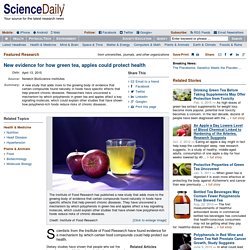
Dietary studies have shown that people who eat the largest amounts of fruit and vegetables have a reduced risk of developing chronic conditions, such as heart disease and cancer. There could be several reasons for this. Some fruit and vegetables naturally contain high amounts of compounds called polyphenols, which could provide protective health benefits. What Sleep Deprivation Does to Your Brain, in One Stunning Infographic.
The common cold may be pretty far down the disease totem pole, but that doesn't make it any more tolerable.
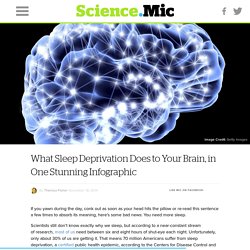
Despite all the brilliant advances in modern medicine, nothing makes a worthless, incurably sniffly mess like a good, old-fashioned cold virus. But a team from McMaster University in Ontario thinks it has the key to saving you some sick days. The study, published in the science journal Nature Immunology, identified a protein usually involved in metabolism that helps your immune system detect viruses in your body. It works by triggering an antiviral response — exactly what your body needs to do if it wants to fight off enemy viruses. But knowing the mechanism to track down viruses is much bigger than alleviating common colds and herpes.
"This identifies a critical component of the machinery that immune cells use to detect viruses," Brian Lichty, a professor of pathology and molecular medicine at McMaster University, told Mic in a phone call on Monday. Obésité et diabète de type 2 : des cellules au carrefour du microbiote et de l'inflammation ? Le diabète de type 23 et l'obésité sont des pathologies sévères intimement liées qui ont progressé partout dans le monde et en France4.
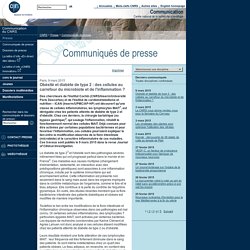
Ces maladies aux causes multiples (changement d'alimentation, sédentarité, en interaction avec des prédispositions génétiques) sont associées à une inflammation chronique, induite par le système immunitaire qui est anormalement activé. Cette inflammation est présente non seulement dans le sang mais aussi dans les organes impliqués dans le contrôle métabolique de l'organisme, comme le foie et le tissu adipeux. Elle contribue à la perte du contrôle de l'équilibre glycémique. En outre, des études récentes montrent que la flore bactérienne intestinale des patients diabétiques et obèses est modifiée de manière importante.